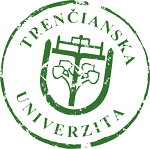CENTRE OF EXCELLENCE FOR CERAMICS, GLASS AND SILICATE MATERIALS, ALEXANDER DUBČEK UNIVERSITY OF TRENČÍN
The Alexander Dubček University of Trenčín is one of the youngest universities in Slovak Republic (established in 1997). Despite its short history, the University has an ambition to be a part of European research area, and educational system, and to contribute to development of human wellbeing in all its aspects. The main goals of the university are defined as follows:
- To maintain and develop its identity as a scientific and educational institution in the university education in Slovakia, and abroad,
- To create conditions for high quality education in technical, economic, social, and health care studies,
- To prepare its graduates in the way, which would ensure achievement of the highest degree of personal and professional quality, and humanism,
- To contribute to scientific and cultural development and economic prosperity of the society.
The university was from the beginning established as a center of education, which met the requirements of local industry for high quality technical personnel in the area of materials, industrial technologies, and quality management. The University also provides requested research capacities and power for collaboration with local industries, especially chemical, machinery, automotive, glass, and defense. The research areas covered can be defined as follows:
- Identification, automation and process control
- Materials research in all its aspects, including metallic, and both organic and inorganic nonmetallic
- materials (i.e. rubber and polymers, and ceramic and glass)
- Environmental engineering,
- Functional design,
- Health care.
In 2014 the University obtained the certificate on quality control management ISO 9001:2008. The University consists of six organizational units (four faculties, one university department and one research center). The research Centre – Centre of excellence for ceramics, glass, and silicate materials (CEKSiM) is intended to be upgraded to higher level through the proposed teaming project. The details on the University can be found at www.tnuni.sk.
CEKSiM The Centre has been established in 2013 as a joint venture of three Slovak research and educational institutions:
- Alexander Dubček University of Trenčín,
- Institute of Inorganic Chemistry, Slovak Academy of Sciences,
- Institute of Materials Research, Slovak Academy of Sciences.
The Centre employs at present 18 researchers and engineers, and apart from research activities provides education at the second (master) and the third (PhD) level of education in the study program Inorganic technology and materials. 8 PhD students studied in the Centre in 2016. The Centre is not a legal entity. The main managing organ of the Centre is the Coordination board, consisting of statutory representatives of the three partner institutions. The Coordination board meets annually and defines the strategic scientific goals of the Centre. The Coordination board appoints the head of the Centre, who is responsible for daily management of the Centre, achieving of strategic goals and reporting to the Coordination board on their regular meetings. The Coordination board and the head of the Centre are advised by the Scientific board. The members of the Scientific board are two leading scientist from each partner institution, and one external member. The Industrial board advises the Scientific board and the head of the Centre in the matters related to industrial research, and helps to pinpoint the research
areas relevant for regional industry.
The main goals of the Centre are as follows:
The strategic goal: Support of excellent research in the area of ceramics, glass, and silicate materials with emphasis on development of required infrastructure and international collaboration.
Implementation of the strategic goal should result in:
- Through research outputs to become one of the technological leaders in the Trenčín region and n Slovakia,
- Improvement of critical research infrastructure in the area of interest,
- Improvement of the process of education of a new generation of highly qualified researchers and engineers for regional industry,
- Through intensive cooperation with industry, enhancing the competiveness of the region, and creation of new workplaces,
- Facilitating of efficient transfer of knowledge and innovations from academia to industry,
- Intensification of international collaboration, through participation in EU framework programs,
- Involvement of the Centre in the activities defined in Regional Innovation Strategy (RIS), and direct implementation of the Centre into the structure of the Regional Innovation Centre.
The research topics covered in the Centre can be defined as follows:
- Relations among the composition, structure and physical properties of glass,
- Development of new types of industrial glasses,
- Glass melting and forming, including modeling of formation and relaxation processes in glass,
- Glasses with photoluminescent properties,
- Corrosion and weathering of glass,
- Vitrification and immobilization of radioactive waste.
The details on the Centre can be found at www.ceksim.eu.
- Centre of Excellence for Ceramics, Glass and Silicate Materials, Alexander Dubček University of Trenčín
Študentská 2
911 50 Trenčín
Slovakia- Prof. Dušan Galusek, dusan.galusek@tnuni.sk







